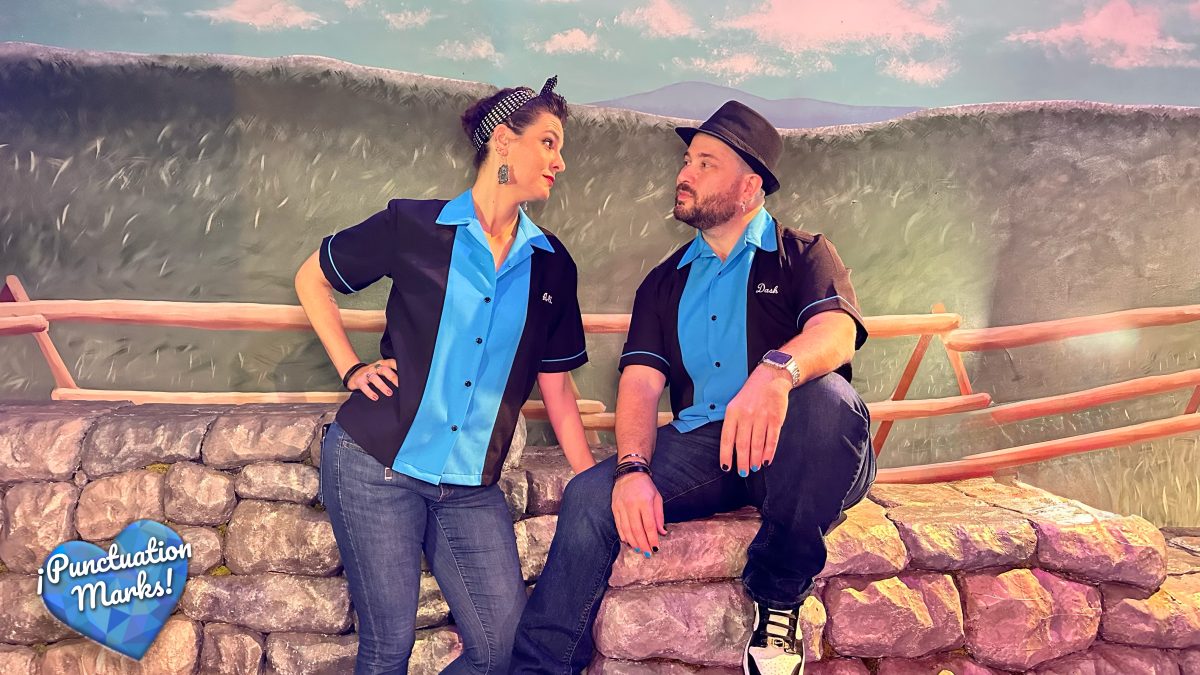Dash and Ali harken back to the days of the classic TV sitcom, improvised in front of a live! studio! audience! Enjoy an episode of I Love Bob and Linda–a show about love, life, family, and hijinks, inspired by some of your favorite TV couples.
Ali K. Garcia, Dash Ruiz
Miami, Fla.
Schedule
¡Punctuation.Marks! will perform in the 9:00 p.m. block at the HCC Mainstage Theatre on Friday, August 8.
Previous Countdown Improv Festival appearances
2024, 2023, 2022, 2021, 2020, 2019
Images
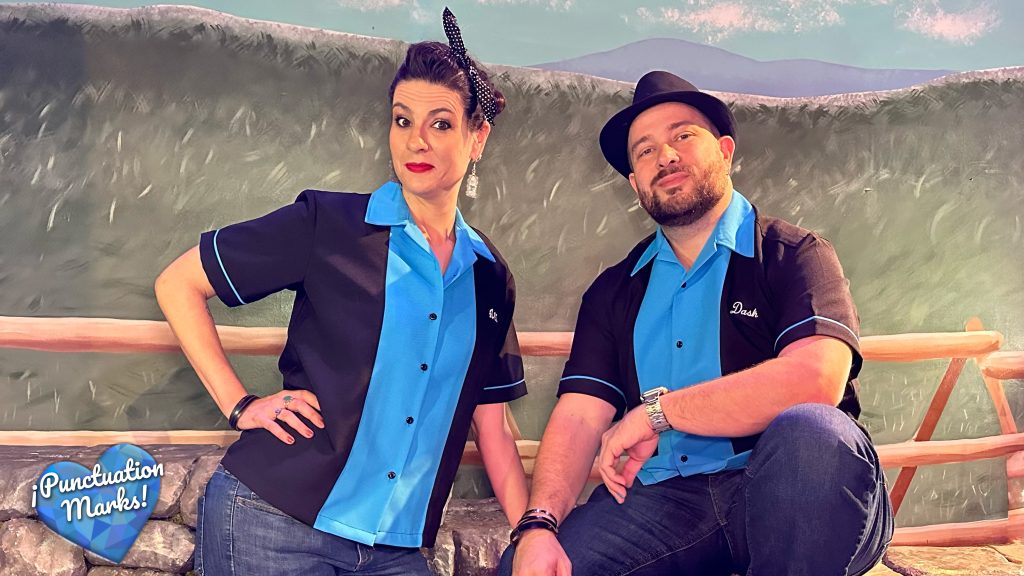
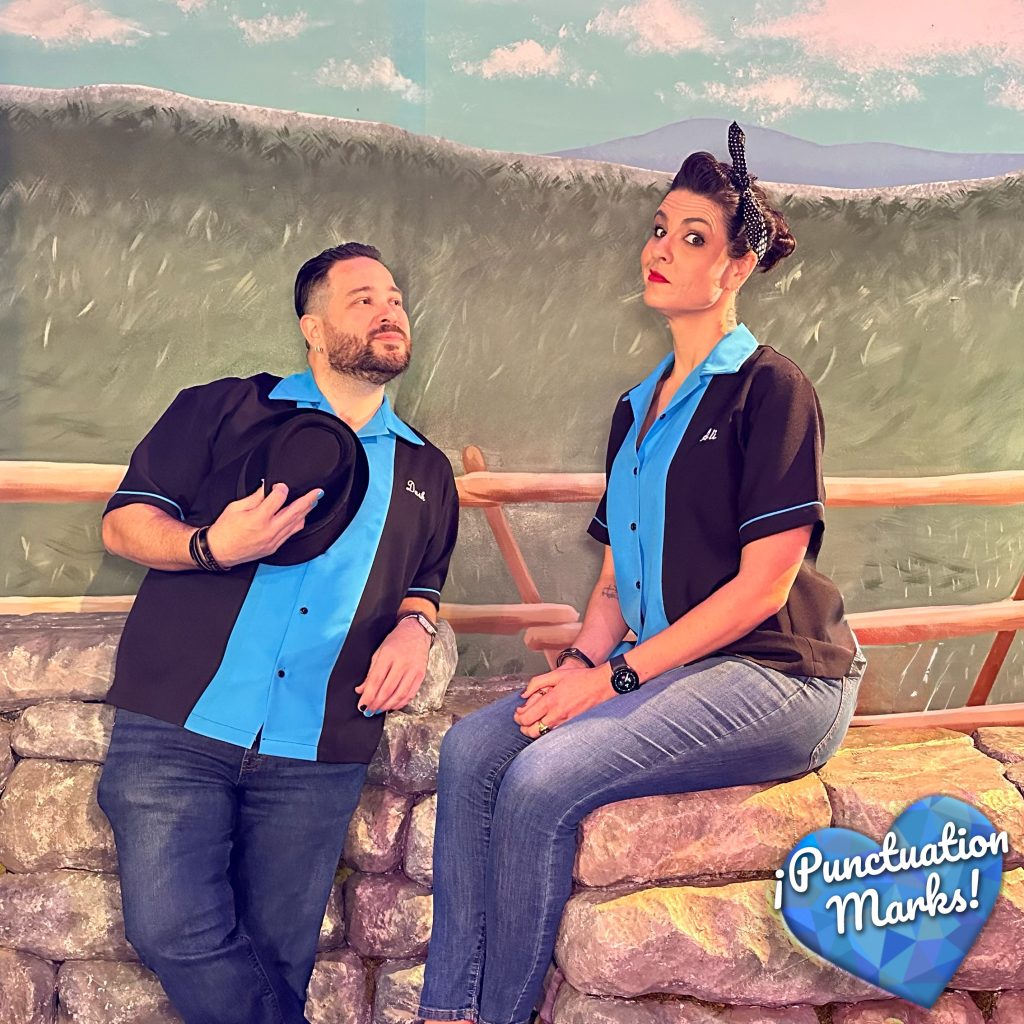
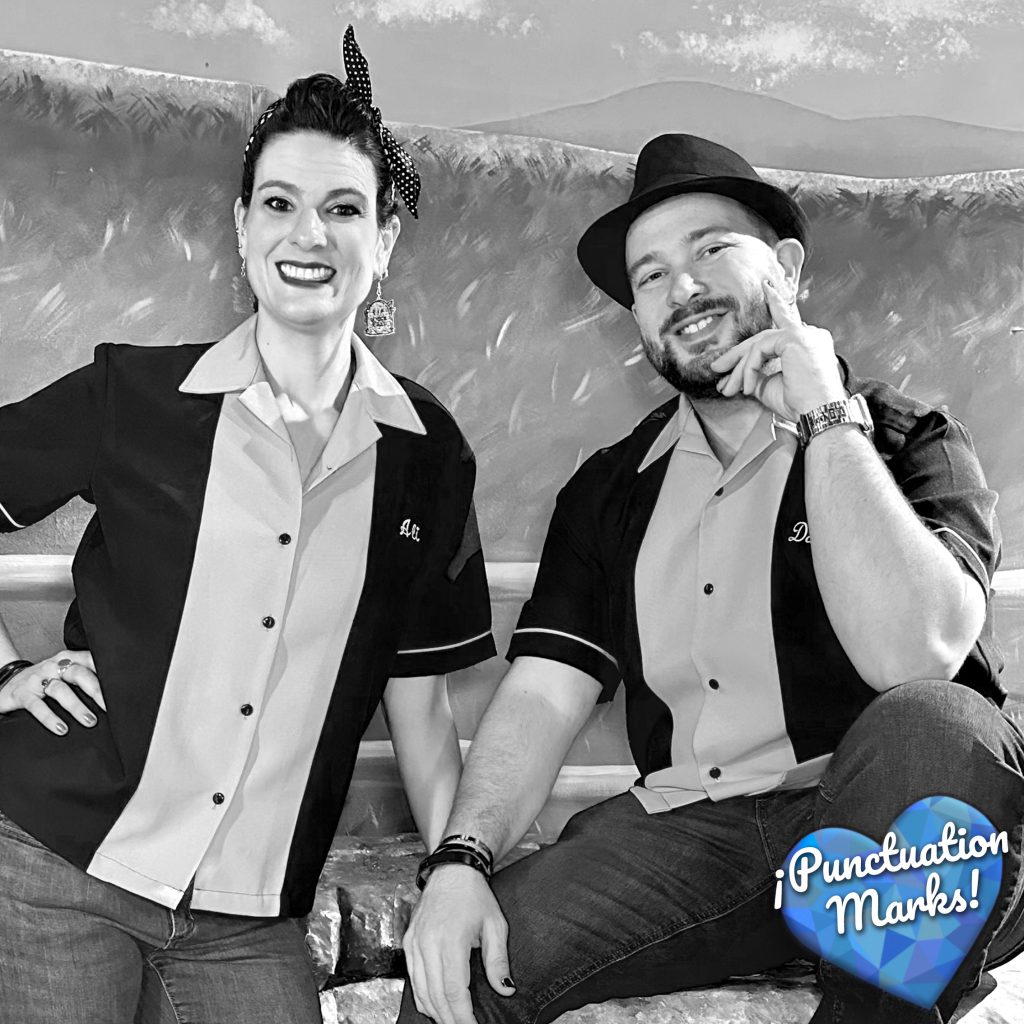
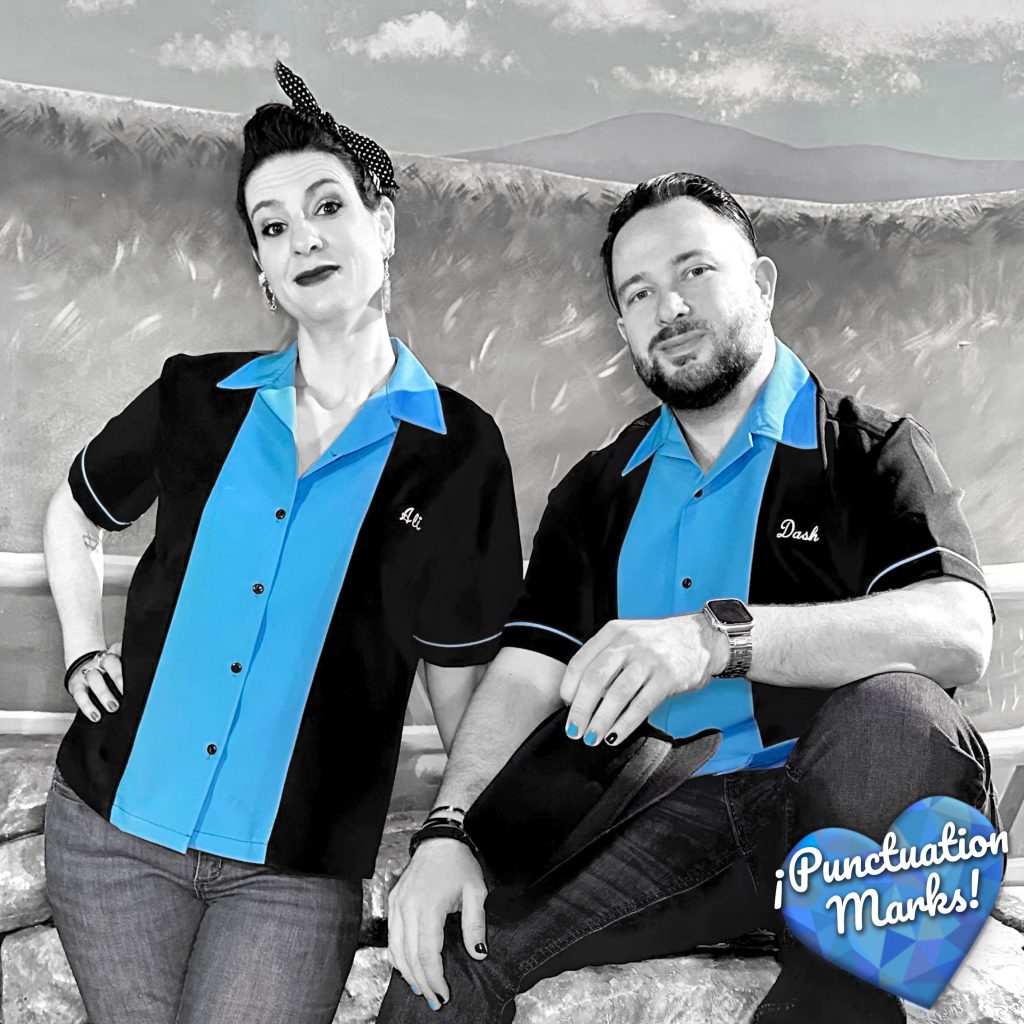
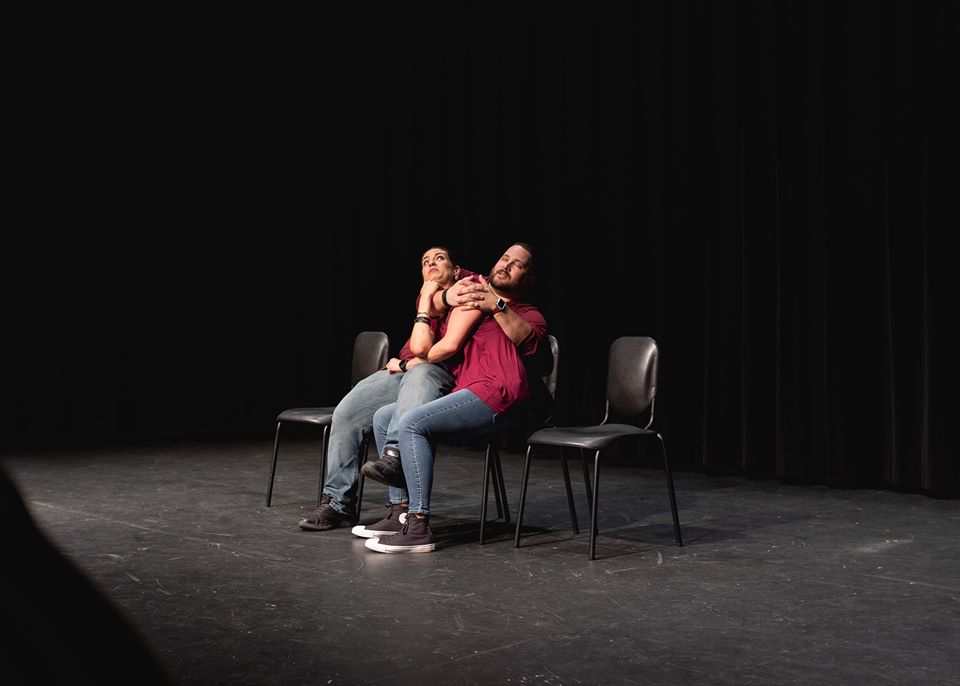
Click here to sponsor ¡Punctuation.Marks! at the 2025 Countdown Improv Festival.
Video
Troupe bio
Ali and Dash dated for three years, but they don’t anymore. Instead of letting this drive them apart, they channeled it and developed an improvised one-act play that explores the humorous reality of relationships.
Interview (from 2019)
We’re super glad that the two of you are back with us this year. Tell us about ¡Punctuation.Marks!’ format. What can audiences expect?
Dash Maverick: We’ve worked out a few formats throughout our existence as a duo. The one we’re doing at Countdown is called “It’s Complicated.” Originally it was meant to be a contained improv show for a microtheater project in Miami. The show fell through due to scheduling conflicts, but we fell in love with the format. We take a suggestion by asking an audience member for their latest social media post. We are then inspired by that idea and we see a relationship between a couple, and others in their lives.
Alicia K. Garcia: I think a lot about social media and the personas we create there. Social media has become really important in so many facets of our lives; it can be personal and impersonal at the same time. We thought that paradox was really interesting. “It’s Complicated” should be entertaining and funny, but it’s okay if the audience feels other feelings, too. Relationships are as chaotic and magical and complex and funny as the people in them; it’s okay to feel the complicated feelings and to have laughter living underneath.
“It’s Complicated” is at least partially inspired by the fact that the two of you used to date. How true to life can audiences expect your show to be? Do you ever draw from scenarios that actually happened in your former relationship?
DM: There’s a lot of really grounded reality in our form. We want it to be real. We want it to be familiar. At some of our shows we’ll be doing the form and we can see couples in the crowd poking each other and saying, “That’s so you!” We love seeing that happen. We also take the reality and play just slightly left of normal. Just weird enough to be funny and interesting but also real enough that any couple in the crowd will relate.
AG: I think our relationship has allowed us to be really comfortable in and with each other’s space, and to know how the other person thinks. We know that whatever is going to happen, we’ll both be on the ride. That’s really comforting. Because of our past, I tend to draw on a memory or a feeling that the suggestion sparks. In that way, I, at least, am pulling from real life, but then turning it up a notch or making it a funnier, parallel-universe version of that. We’re not always a romantic couple—sometimes we’re best friends, or siblings. In the end, we usually end up playing two people who, in some way, love and respect each other, which is what we are outside of improv-world too.
Your shows always have a really neat hook to them. How do you go about devising your show formats? Have you ever come up with something that you thought would be great but wasn’t?
DM: We love making up formats. I like to think of myself as somewhat of an improv ingénieur. Ali helps sometimes. (AG: HA!) She’s excellent at coming up with the base idea, and I’ve found that my talent lies in finding the best way of making work in a show. To me games need to have a few characteristics. They should be funny, easy to understand and follow, interesting. They should also have a goal, a way to heighten, and a loose enough format that you don’t feel pigeonholed.
AG: We both just think about improv a lot and we like to just try new ideas to see if they work. “It’s Complicated” came out of that, as have so many other ideas. Some work and some don’t. But I like to really pay attention to the little improv moments in life, and see if they could turn into something. I’ll be eating dinner, or watching TV, or witnessing a conversation and then I get inspired for a game. We’ve had ideas that we workshopped and didn’t work—one in particular never evolved into the backline game I thought it could be, but it was a fun warm up we did so something came out of it.
You’ll also be performing on Friday night alongside Chris Miranda with your troupe The B-Team. Compare and contrast each group’s performing style.
DM: Our duo tends to be more grounded, and focuses a lot on a single relationship. The form we’re doing as B-Team with Chris is called the “Hyperlink.” That form is much less grounded, goes off on crazy tangents, and much faster paced. It’s great to be able to play both ends of the spectrum.
AG: Dash and I basically grew up in improv together—same teachers, same team, all of that. Playing with Dash is really familiar, which can be great in many ways, but we sometimes get too comfortable in scenes and don’t make the challenging choices. Chris trained differently than we did and I think it adds so much when he plays with us. He challenges me in scenes and it can get really fun and weird in the best possible way.
Both of you also perform with Society Circus Players, a larger troupe out of Miami. Is there a symbiotic relationship between all of your projects? How does your small-group work influence your work with the larger ensemble, if at all?
DM: We spend a lot of time working with the whole group. Most of our rehearsal time is spent like that. It’s nice when we get to focus on more of the one-on-one stuff. I would say it definitely helps with stronger scene work and relationship building in some of SCP’s long forms.
AG: I think any improv group as a whole grows when they really work on just creating scenes between two people. Everything else is just an extension of that. Working together on a small scale ripples out into the larger group. Also, we sometimes bring ideas to the larger group that don’t seem to be working on the smaller scale and try to workshop them into something.
How has the South Florida improv scene changed and evolved since you first started performing? What do you like about performing there?
DM: Ali and I started performing around the same time. Since then there’s a lot of new indy troupes and a few more big theater companies that have opened up. It’s definitely brought a lot more improvisors and a lot more attention to the improv scene in Miami.
AG: Two of my favorite things have really grown during my time in Miami. One is the craft beer scene and the other is the improv community. I think it’s really interesting to see the nuances of how other groups and theaters play, how they do their shows, what games and styles they prefer. Everyone has a unique flavor, which is really cool to see.
Finally, Dash, you’ve got a really cool car. This isn’t a question so much as an observation, we guess, but, still: What’s it like having such a cool car?
DM: Thanks! It’s a Dodge Charger modeled after Barricade, the police car from the Transformers movies. Every time I start considering, “maybe it’s time to lose the Decepticon look?” Someone will inevitably say, “Dude your car is awesome!” or a police officer will pull me over and tell me how cool it is, then let me off with a warning. After that, I keep them on.
AG: I mean… 2007 Silver Saturn Ions are pretty cool too. ☺︎

